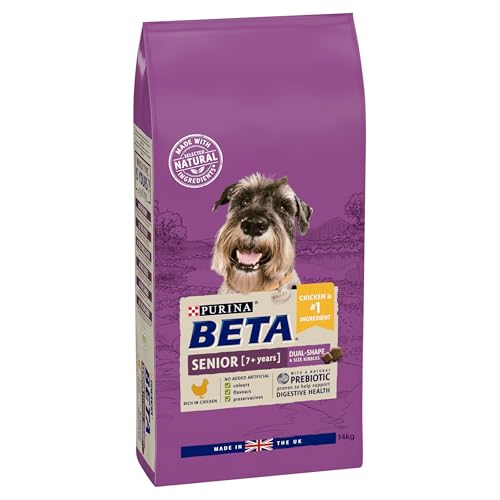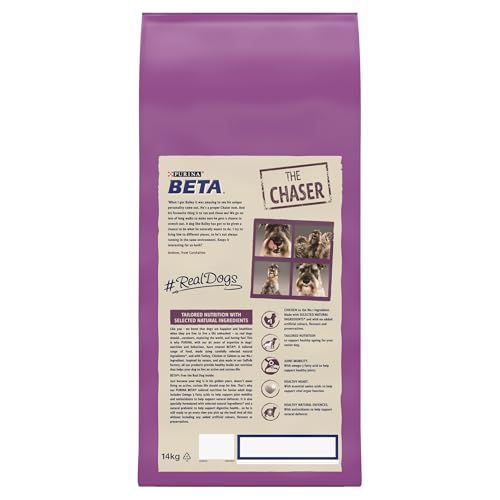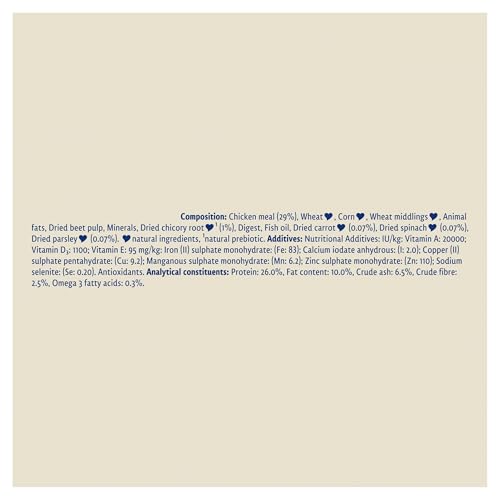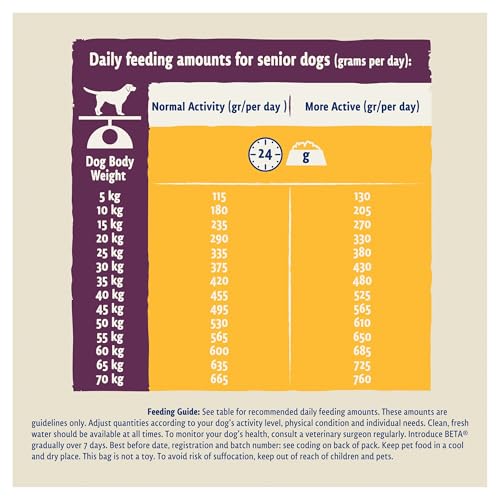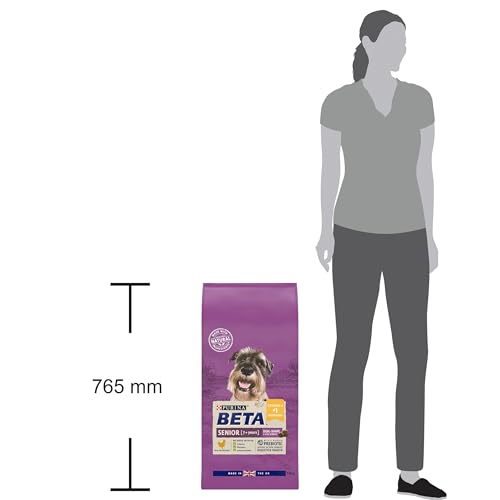
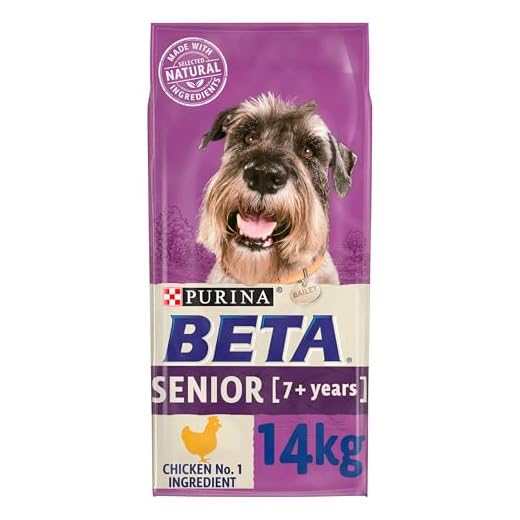







As a devoted dog owner, I know firsthand the challenges of finding the perfect food for our beloved small senior dogs with sensitive stomachs. As they age, their nutritional needs change, and their digestive systems often become more delicate. It can be disheartening to see them struggle with discomfort after meals, which is why choosing the right diet is crucial for their health and happiness.
My journey to find the best dog food for my ageing canine companion led me through a maze of options, each promising to be the solution. I realised that understanding the specific needs of small senior dogs is the first step. They require a balanced diet that supports their joints, maintains their weight, and is gentle on their stomachs. This means looking for ingredients that are easy to digest and avoiding common irritants.
In this article, I’ll share the insights I’ve gained and the top choices of dog food that have worked wonders for my furry friend. Whether you’re dealing with food allergies, intolerances, or simply a picky eater, the right food can make all the difference. Join me as we explore the best options to keep our small senior dogs healthy, happy, and free from digestive issues.
Understanding the Dietary Needs of Small Senior Dogs
Caring for a small senior dog requires a keen understanding of their unique nutritional needs. As dogs age, their metabolism slows down, and their digestive systems can become more sensitive. This means that what they eat plays a crucial role in maintaining their overall health and well-being. In my experience, it’s essential to adjust their diet to ensure they receive the right nutrients while avoiding ingredients that could upset their stomachs.
One of the main considerations for older small dogs is their calorie intake. Senior dogs tend to be less active, so they require fewer calories to maintain a healthy weight. However, it’s important to ensure they still receive sufficient protein to support muscle maintenance. High-quality, easily digestible proteins are particularly beneficial for these dogs, as they provide the necessary nutrients without overloading their digestive systems.
Key Nutritional Components for Senior Dogs
When selecting food for small senior dogs, there are several key components to look for:
- Protein: Opt for high-quality sources such as chicken, turkey, or fish. These are easier on the stomach and provide essential amino acids.
- Fibre: Increased fibre helps support digestive health, which is crucial for senior dogs with sensitive stomachs. Ingredients like sweet potatoes and pumpkin are excellent fibre sources.
- Healthy Fats: Omega-3 and Omega-6 fatty acids from fish oil or flaxseed can help support joint health and maintain a healthy coat.
- Vitamins and Minerals: Senior dogs need a balanced mix of vitamins and minerals to support their immune system and overall health. Look for foods fortified with antioxidants, vitamins E and C, and minerals like zinc and selenium.
- Low Sodium: Reduced sodium levels are beneficial to prevent heart and kidney issues that are more common in older dogs.
It’s also important to avoid common allergens and irritants such as artificial colours, flavours, and preservatives. Many senior dogs benefit from a diet free from grains, which can sometimes cause digestive upset. Opting for a natural, holistic approach to their diet can make a significant difference in their health and quality of life.
Lastly, always consult with your veterinarian before making significant changes to your dog’s diet. They can provide tailored advice based on your dog’s specific health needs and help you select the best food to keep your senior companion happy and healthy.
Common Causes of Sensitive Stomachs in Older Dogs
As our furry companions age, their digestive systems often become more delicate and prone to issues. It’s heart-wrenching to see our senior dogs struggle with stomach problems, but understanding the common causes can help us manage their health better. Various factors can contribute to sensitive stomachs in older dogs, and recognising these can aid in providing the appropriate care and diet.
One primary reason for digestive sensitivity in senior dogs is the natural ageing process. As dogs grow older, their digestive efficiency diminishes, making it harder for them to process certain foods. This can lead to gastrointestinal distress, characterised by symptoms such as vomiting, diarrhoea, and gas. In addition, the production of digestive enzymes decreases with age, further complicating their ability to digest food properly.
Common Contributing Factors
- Dietary Changes: Even minor alterations in diet can trigger digestive issues in older dogs. Their stomachs are less adaptable to new foods, which can lead to sensitivity.
- Food Allergies or Intolerances: Over time, dogs may develop allergies or intolerances to certain ingredients, such as specific proteins or grains, which can cause stomach upset.
- Chronic Diseases: Conditions like inflammatory bowel disease (IBD), pancreatitis, or liver disease are more prevalent in older dogs and often result in sensitive stomachs.
- Medications: Many senior dogs are on medications for various health issues. Some of these drugs can cause gastrointestinal side effects, contributing to stomach sensitivity.
- Stress and Anxiety: Older dogs might experience stress and anxiety due to changes in their environment or routine, which can lead to digestive disturbances.
- Dehydration: Reduced water intake or an inability to absorb fluids properly can exacerbate digestive problems, making the stomach more sensitive.
It’s crucial to monitor our senior dogs closely and consult with a veterinarian to tailor their diet and care to their specific needs. By understanding and addressing the underlying causes of their sensitive stomachs, we can help ensure they remain comfortable and healthy in their golden years.
Key Ingredients to Look for in Dog Food for Sensitive Stomachs
When selecting the right food for my small senior dog with a sensitive stomach, I pay close attention to the ingredients. It’s crucial to choose foods that are gentle on their digestive system and provide all the necessary nutrients. Over the years, I’ve found certain ingredients to be particularly beneficial.
Firstly, high-quality protein sources are essential. Ingredients such as chicken, turkey, or fish are easier for my dog to digest compared to lower-quality meat by-products. Additionally, I look for proteins that are labelled as “whole” or “deboned” to ensure they are of the best quality.
Beneficial Ingredients for Sensitive Stomachs
- Prebiotics and Probiotics: These help maintain a healthy balance of gut bacteria, aiding digestion and reducing the risk of gastrointestinal issues. I always check for ingredients like chicory root or dried fermentation products.
- Fibre: Adequate fibre supports digestion and prevents constipation or diarrhoea. Sources such as sweet potatoes, pumpkin, and brown rice are gentle and effective.
- Omega-3 and Omega-6 Fatty Acids: These fatty acids, often found in fish oil and flaxseed, help reduce inflammation and support overall digestive health. They also benefit my dog’s skin and coat.
- Limited Ingredient Diets: Foods with fewer ingredients reduce the chance of allergens and irritants. I often opt for recipes with single protein sources and minimal additives.
Another critical aspect is avoiding common allergens and irritants. Ingredients like wheat, corn, and soy can be hard to digest and often cause allergic reactions. By steering clear of these, I ensure my dog’s diet is less likely to trigger stomach issues.
Lastly, natural preservatives and flavourings are preferable. Artificial additives can upset my dog’s stomach, so I look for foods preserved with tocopherols (vitamin E) and flavoured with natural ingredients. This not only keeps the food safe and tasty but also gentle on my dog’s digestive system.
Recommended Dog Food Brands for Small Senior Dogs
As our beloved small dogs age, their dietary needs evolve, requiring special attention to ensure they remain healthy and vibrant. Small senior dogs often have specific nutritional needs, including lower calorie content, enhanced joint support, and easily digestible ingredients. It’s crucial to find a dog food that caters to these requirements, keeping in mind their sensitive stomachs and the potential for age-related health issues.
Having researched and tested various dog food brands, I’ve compiled a list of those that stand out in terms of quality and effectiveness. These brands have been selected based on their ingredient quality, nutritional balance, and positive feedback from pet owners and veterinarians alike. Let’s dive into some of the best options available.
Quality Brands for Small Senior Dogs
-
Hill’s Science Diet – This brand is renowned for its scientific approach to pet nutrition. Their senior small dog formulas are designed with easily digestible ingredients, fortified with omega-3 fatty acids for joint health, and enhanced with antioxidants to support a robust immune system. Many pet owners have reported noticeable improvements in their dogs’ coat health and overall vitality.
-
Royal Canin – Tailored specifically for small senior dogs, Royal Canin offers formulas that support healthy ageing. Their kibble is designed to be easy for small dogs to chew, and the blend includes EPA and DHA to promote brain health. The inclusion of high-quality proteins and prebiotics aids in maintaining digestive health, making it a great choice for dogs with sensitive stomachs.
New ArrivalHomemade Dog Food Guide for Pet OwnersGuide to safe and tasty canine mealsThis comprehensive guide provides pet owners with a step-by-step approach to creating tasty and safe meals for their dogs at home, ensuring healthy and enjoyable dining. -
Blue Buffalo Life Protection – Known for its natural ingredients, Blue Buffalo offers senior dog foods that are free from poultry by-products, corn, wheat, and soy. Their small breed senior recipes include glucosamine and chondroitin for joint support, and are packed with wholesome grains, vegetables, and fruit, ensuring a balanced diet for older dogs.
-
Nutro Ultra – This brand focuses on high-quality protein sources, such as chicken, lamb, and salmon, which are essential for muscle maintenance in senior dogs. Nutro Ultra’s small breed senior formula is rich in superfoods like blueberries and chia seeds, providing a well-rounded diet that supports both digestion and overall health.
Choosing the right food for your small senior dog can make a significant difference in their quality of life. These brands offer well-researched, high-quality options that cater specifically to the needs of older dogs with sensitive stomachs. Always consult with your veterinarian to determine the best dietary choices tailored to your pet’s individual health needs.
Homemade Dog Food Recipes for Sensitive Stomachs
As my dog aged, I noticed that her stomach became increasingly sensitive. Commercial dog foods, even those labelled for sensitive stomachs, often caused her discomfort. This prompted me to start preparing homemade meals for her, focusing on gentle ingredients that would be easy on her digestive system.
Through trial and error, I’ve developed a few recipes that my dog loves and digests well. These recipes use simple, wholesome ingredients and are easy to prepare. Below, I’ll share some of the tried-and-tested meals that have helped keep my senior dog’s stomach happy and healthy.
Recipes and Ingredients
1. Chicken and Rice DelightThis classic combination is a go-to for dogs with digestive issues. It’s bland yet nutritious.
- Ingredients:
- 1 cup of boneless, skinless chicken breast
- 1/2 cup of brown rice
- 1/2 cup of finely chopped carrots
- 1 tablespoon of pumpkin puree
- Preparation:
- Boil the chicken until fully cooked, then shred it into small pieces.
- Cook the brown rice according to package instructions.
- Steam the carrots until tender.
- Mix all the ingredients together with the pumpkin puree.
2. Turkey and Sweet Potato StewThis hearty meal is gentle on the stomach and packed with nutrients.
- Ingredients:
- 1 cup of ground turkey
- 1 medium sweet potato, peeled and cubed
- 1/2 cup of green beans, chopped
- 1 teaspoon of olive oil
- Preparation:
- Cook the ground turkey in a pan with the olive oil until no longer pink.
- Boil the sweet potato cubes until soft.
- Steam the green beans until tender.
- Combine all ingredients and mix well.
3. Fish and Quinoa MedleyFish is a great protein source for dogs with sensitive stomachs, and quinoa is a good alternative to traditional grains.
- Ingredients:
- 1 cup of cooked white fish (cod or haddock)
- 1/2 cup of quinoa
- 1/4 cup of peas
- 1 tablespoon of olive oil
- Preparation:
- Cook the fish thoroughly and flake into small pieces.
- Prepare the quinoa according to package instructions.
- Steam the peas until soft.
- Combine all ingredients and drizzle with olive oil.
These homemade meals have been a game-changer for my dog. By carefully selecting ingredients that are easy to digest, I can ensure that she stays healthy and comfortable. I hope these recipes can help other dog owners dealing with similar issues. Remember to consult your vet before making any significant changes to your dog’s diet.
Tips for Transitioning Your Senior Dog to a New Diet
Switching your elderly dog to a new type of food can be a delicate process, especially if they have a sensitive stomach. It’s important to make the transition gradual to avoid any digestive issues. In this guide, I’ll share some practical tips that have worked well for my senior dog.
First and foremost, always consult your vet before making any changes to your dog’s diet. They can provide personalised advice based on your pet’s specific health needs and conditions. Once you have the go-ahead, you can begin the transition process.
Gradual Transition Process
A slow and steady transition is key to ensuring your senior dog adapts well to the new food. Here’s a step-by-step approach I recommend:
- Start with a Mix: Begin by mixing a small amount of the new food with their current food. A typical ratio to start with is 25% new food and 75% old food.
- Increase Gradually: Over the course of a week, gradually increase the proportion of the new food. You can adjust the mix to 50% new and 50% old food by mid-week, and then 75% new and 25% old food towards the end of the week.
- Monitor Closely: Keep a close eye on your dog’s reaction during the transition. Watch for any signs of digestive upset, such as diarrhoea, vomiting, or a decrease in appetite.
In addition to these steps, there are a few additional tips to keep in mind:
- Hydration is crucial: Ensure your dog has access to plenty of fresh water, especially when introducing new food. Proper hydration can help mitigate potential digestive issues.
- Small, frequent meals: Instead of two large meals a day, try offering smaller, more frequent meals. This can be gentler on a sensitive stomach and help with the adjustment.
- Patience and persistence: Some dogs take longer to adapt to new food. If your dog is particularly sensitive, extend the transition period to two weeks or more.
By following these tips, you can help ensure that the transition to a new diet is smooth and stress-free for your senior dog. Patience and close monitoring are essential to make sure they stay healthy and happy throughout the process.
Frequently Asked Questions About Feeding Small Senior Dogs
Feeding a small senior dog with a sensitive stomach can be a bit challenging, but with the right information, you can ensure your furry friend gets the nutrition they need to stay healthy and happy. Here are some frequently asked questions about feeding small senior dogs:
1. How do I know if my small senior dog has a sensitive stomach?
Answer: Some signs of a sensitive stomach in small senior dogs include vomiting, diarrhea, gas, bloating, and changes in appetite. If you notice any of these symptoms, it’s essential to consult your veterinarian to rule out any underlying health issues.
2. What should I look for in a dog food for my small senior dog with a sensitive stomach?
Answer: When choosing a dog food for a small senior dog with a sensitive stomach, look for formulas that are easily digestible, made with high-quality ingredients, and free from common allergens such as wheat, corn, and soy. Opting for limited ingredient diets or foods with novel protein sources can also be beneficial.
3. How often should I feed my small senior dog with a sensitive stomach?
Answer: The feeding frequency for small senior dogs with sensitive stomachs can vary depending on their individual needs and any specific dietary recommendations from your veterinarian. In general, dividing their daily portion into smaller, more frequent meals can help prevent digestive upset and promote better digestion.
4. Can I give my small senior dog with a sensitive stomach treats?
Answer: Yes, you can still give your small senior dog treats, but it’s essential to choose ones that are gentle on their sensitive stomach. Look for treats made with simple, natural ingredients and avoid those that contain artificial additives, fillers, or common allergens.
5. Should I consult my veterinarian before making any dietary changes for my small senior dog?
Answer: Yes, it’s always a good idea to consult your veterinarian before making any significant dietary changes for your small senior dog, especially if they have a sensitive stomach or any underlying health conditions. Your vet can provide personalized recommendations based on your dog’s specific needs and help ensure they receive the best possible nutrition.
Ensuring your small senior dog with a sensitive stomach receives the proper nutrition is essential for their overall health and well-being. By following these tips and consulting with your veterinarian, you can help your furry friend thrive in their golden years.
Best Dog Food For Small Senior Dogs With Sensitive Stomachs
Features
| Size | 7.5 kg (Pack of 1) |
Features
| Part Number | 12231689 |
| Model | 12531980 |
| Color | transparent |
| Release Date | 2014-05-23T00:00:01Z |
| Size | 1 count (Pack of 1) |
Features
| Part Number | 12231684 |
| Model | 12530962 |
| Color | transparent |
| Release Date | 2014-05-23T00:00:01Z |
| Size | 1 count (Pack of 1) |
| Price history for Salmon and Rice Sensitive Dog Food | |
|---|---|
|
Latest updates:
|
|
Features
| Part Number | HARRTV-15 |
| Model | HARRTV-15 |
| Color | Turkey |
| Is Adult Product | |
| Size | 15 kg (Pack of 1) |
| Language | English |
Features
| Is Adult Product | |
| Release Date | 2025-05-17T00:00:01Z |
| Language | English |
| Number Of Pages | 213 |
| Publication Date | 2025-05-17T00:00:01Z |
Features
| Is Adult Product | |
| Release Date | 2025-04-27T00:00:01Z |
| Language | English |
| Number Of Pages | 203 |
| Publication Date | 2025-04-27T00:00:01Z |
Q&A:
What should I feed my small senior dog with a sensitive stomach?
For small senior dogs with sensitive stomachs, it’s important to choose a dog food that is specifically formulated for their needs. Look for options that are labelled as being suitable for sensitive stomachs and are designed for senior dogs.
What are some key ingredients to look for in dog food for small senior dogs with sensitive stomachs?
Opt for dog foods that contain easily digestible proteins such as chicken, turkey, or fish. Look for added prebiotics and probiotics to promote healthy digestion. Additionally, consider options with limited ingredients to minimize the risk of triggering stomach sensitivities.
Are there any ingredients I should avoid in dog food for small senior dogs with sensitive stomachs?
Avoid dog foods that contain artificial additives, preservatives, and fillers as these can exacerbate digestive issues in sensitive dogs. Additionally, steer clear of common allergens such as corn, wheat, and soy. Opt for natural and wholesome ingredients instead.
How can I introduce a new dog food to my small senior dog with a sensitive stomach?
When transitioning to a new dog food, do so gradually over the course of about a week. Start by mixing a small amount of the new food with your dog’s current food, then gradually increase the ratio of new to old food each day. This gradual transition helps prevent digestive upset and allows your dog’s stomach to adjust to the new diet.












